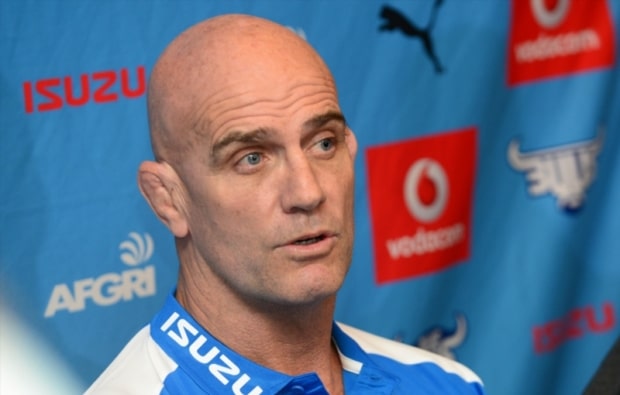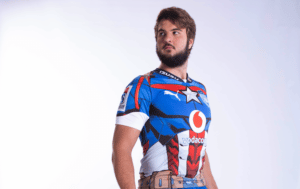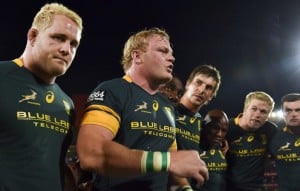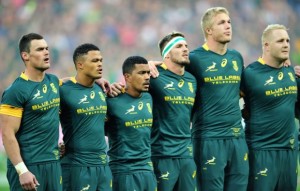New Bulls boss John Mitchell talks to SIMON BORCHARDT about his role at the union, mentoring Nollis Marais, and how he’s grown as a coach since leaving the Lions.
What exactly does the role of Bulls executive of rugby entail?
My role requires me to help build the union and be a hands-on coach. I will sit on the board and represent the union’s high-performance department along with [high-performance manager] Xander Janse van Rensburg.
Nollis Marais will be the Blue Bulls head coach in the Currie Cup. What role will you play then?
The Currie Cup will be important for us, as we want to bed down our processes before pre-season and next year’s Super Rugby tournament. It’s likely I will help with the team’s attack, and structure the roles and responsibilities of the three coaches, including myself. I may not be involved in every Currie Cup campaign from a hands-on point of view, but I will be for this one. We have to place our best resources and people in the right place quickly.
Will you effectively be the Bulls head coach during Super Rugby?
Yes, I expect to take the lead in Super Rugby.
When you were negotiating with the Bulls, did the board insist that Marais stay involved?
One of the reasons I decided to join the Bulls is the integrity of the people at the union and the process they took [to appoint a new coach]. They were very clear, honest and decisive. They gave Nollis a vote of confidence when they appointed him two years ago, and he hasn’t suddenly become a poor coach. I’m happy to help mentor Nollis and help him become a better coach. He said at the press conference [at which Mitchell’s appointment was announced] he would embrace a new role and the chance to learn, and you have to take your hat off to him for that. It’s not nice to experience what he has and you have to feel for his family too. He’s been in the Bulls coaching system for a while, and is passionate about the game and the union. It’s important to retain his intellectual property, and value his strengths and competency. I think the biggest challenge for anyone who’s experienced a setback is to embrace learning and be open-minded about it.
What aspects did you address during your presentation to the Bulls board as part of your job interview?
Fortunately, my daughter, Ciara, who’s doing her masters in clinical psychology, was around to help me with my presentation. She’s pretty sharp on the computer; a lot better than her old man [laughs]! I tried to keep the presentation simple. I gave my diagnosis, and my guiding principle was to say there needed to be significant intervention, because if we keep doing what we are doing, we will get the same results. We don’t need to change everything; just refresh and update. We need to get back to an aggressive, winning, attractive style of rugby. One area of action I did pay particular attention to was game speed, and how we can increase it. Out of that talk comes the process. A lot of coaches talk about increasing a team’s game speed, but not many can implement it. I also explained what I have learned as a coach since leaving the Lions [in 2012]; it was important to demonstrate that to the Bulls panel.
Will it be difficult for you, as an English-speaking Kiwi, to adapt to the Afrikaans culture at the Bulls?
I have lived and worked in South Africa for seven years. I am married to a South African and better equipped to understand the country’s different cultures than a foreign coach who has just arrived. Ultimately, it still comes down to how to get the best out of the personality. I’m still working on my ‘ge’ pronunciation, but I’m sure that will improve [laughs]. I was actually quite surprised by the diversity at the Bulls. The Afrikaans players here can speak English and there are players whose first language is English, Zulu or Xhosa. When [Bulls CEO] Barend [van Graan] was introducing me to the administrative staff the other day, he said, ‘Mitch is already improving my English!’
Why did you decide to leave the USA Eagles to join the Bulls?
USA Rugby has had some financial challenges for a while now. They receive all their income from World Rugby grants and US Olympic funding. The Pro Rugby league is dormant less than a year after it kicked off, which hasn’t helped. Their intermittent model also meant that I wasn’t involved in much hands-on, day-to-day coaching as the players are all over the world. Managing players remotely takes time. As much as I loved working with the players and staff in the US, the opportunity to coach again in Super Rugby could not be ignored. A job at a wonderful union like the Bulls, which has a rich and proud history, does not become available often, so the opportunity to play an executive and operations role to help rebuild a big union, and to be back coaching in a country I love, was too good to turn down. I’m a Kiwi by heritage, and I speak like one, but South Africa is home for me. Blue is also my favourite colour [laughs]!
Were US Rugby happy to release you from your contract, which was set to end only after the 2019 World Cup?
Yes. As I said, they have had some financial challenges and were forced to make budget cuts. [USA Rugby] CEO Dan Payne was transparent about what he wanted from me, and left me with no choice but to make a professional and strategic decision that was best for my family and career. However, I always said I would honour my commitment to help the Eagles qualify for the 2019 World Cup, so I will leave the US after our qualifying matches in June. I really enjoyed the US player group and to see them develop individually and as a team was satisfying. We have some huge matches in June, with Tests against Ireland and Georgia, followed by two World Cup qualifiers against Canada. Staff changes at the Eagles have been more frequent than I’ve been used to, but two of the assistant coaches, Marty Veale and Phil Greening, have been with me the whole way. They are hugely competent in their areas and work tirelessly. [Players] Todd Clever, Blaine Scully and Nate Augspurger have also helped to create a fabulous culture and climate. They have empowered the players to become self-reliant and make the most of our resources.
You’ve said that while the Bulls have talented players, they are low on confidence. How happy are you with the current squad?
It’s difficult for me to say at this point. There is a lot of exciting talent, but the team lacks cohesion, so it’s more about building a team mix than focusing on an individual’s form. We also need to challenge the players’ mentality and approach to the game. They will be expected to give more in a measured way if they want the team to perform and enjoy the benefits of success and joy. I specifically spend a lot of time on selection and enjoy this part of coaching. It’s not something you can rush, you have to really think it through constantly, but the weekly process will provide the answers. Being involved in the Currie Cup will help me assess and make decisions around where we may have positional issues and then decide whether to bring a player to the union so that a youngster in the same position can be given time to develop.
In your autobiography, you wrote that you had grown as a coach and learned a lot since leaving the Lions in 2012. Can you elaborate on that?
My coaching methodology from five years ago is quite different to my new coaching methodology. The biggest thing I’ve learned is that just because I value something, it doesn’t mean another person values that too. To build trust with people, it’s important to understand what they value. However, when I was at the Lions, I stood up for what I valued and that was important to me.
You’ve said you want to bring Bulls fans back to Loftus. What expectations should they have for next season?
Success goes deeper than just talent and team cohesion. Coaches are conditioned to winning and losing, but it can be dangerous to fall into the trap of only focusing on the outcome. Success at the Bulls will be more about filling Loftus and making a lot of people happy. That’s the responsibility we have as a team.
– This Q&A first appeared in the July 2017 issue of SA Rugby magazine
Photo: Lee Warren/Gallo Images





